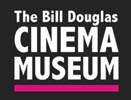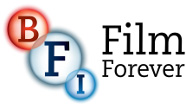Participating Libraries and Archives
The Bill Douglas Cinema Museum at Exeter University
The Bill Douglas Cinema Museum is both a public museum and a research facility at the University of Exeter, housing an enormous collection of material relating to the history of cinema, the moving image and optical entertainment, which ranges from the 17th century up to the present day. It was founded on the extraordinary collection of artefacts put together by renowned British filmmaker Bill Douglas and his friend Peter Jewell and has continued to expand, currently holding around 75,000 items. The collection particularly emphasises the audience’s experience of the moving image and includes optical toys, magic lanterns, prints, images, publicity material and other film ephemera, as well as the biggest book collection on the subject in any British University.
The British Film Institute
Founded in 1933, the British Film Institute, based in London, is a charity governed by a Royal Charter. It combines cultural, creative and industrial roles, bringing together the BFI National Archive and BFI Library, film distribution and exhibition, publishing and festivals. As an Institute, it awards Lottery funding to film production, distribution, education, audience development, market intelligence and research.
The British Library
The British Library is a world renowned institution with a collection of over 150 million items, including manuscripts, newspapers, printed books, magazines, prints, drawings, music scores and patents. It also has an impressive sound archive. Its treasures include the Magna Carta, Leonardo da Vinci’s Notebook and Beatles manuscripts. Our resource includes a number of scrapbooks and event programmes that cover a range of popular entertainments from the late Georgian period and throughout the Victorian and Edwardian era. More information on the British Library and its collections can be found on its website.
Chetham’s Library, Manchester
Founded in 1653 Chetham’s Library is the oldest public library in the English-speaking world. Its entire collection has been designated as one of national and international importance. In addition to the significant collection of early printed books, there is also a wide range of ephemera, diaries, letters, paintings and glass lantern slides. There is a large amount of material relating to local life and entertainment, with commercial broadsides, handbills and scrapbooks.
Harry Ransom Humanities Research Center at the University of Texas, Austin
The HRC is one of the world's finest culture archives, and its performing arts collection is one of its key strengths. Material included here has been selected from individual collections within the performing arts division, including the Harry Houdini collection, the Joe E. Ward Collection, the Circus Collection and the Barnum and Bailey Collection. Details of the HRC's holdings in the area of performing arts can be seen on their website.
Lambeth Archives
Lambeth Archives is a record office, located in the borough of Lambeth, London. It is open to the public free of charge. Amongst other material, the archive includes impressive collections relating to the rich theatrical heritage of Lambeth and Southwark and other popular entertainments in the area. The Vauxhall Gardens Archive, included in our collection, provides a wealth of information on the garden and many other aspects of 18th and 19th century social life and entertainment. More information on Lambeth Archives and its collections can be found on its website.
The May Moore Duprez Archive
The May Moore Duprez Archive remains in private hands, having passed down through the family. Permission to reproduce the collection was given by Malcolm Ross King, her grandson. Ross King (1955-2008) was a Special Effects expert who worked for both TV and film. He was born near the famous studios in Ealing, and, after a career in the RAF, followed his father into the film industry. Ross worked on stunts and special effects on such productions as ‘Thunderbirds’, ‘Tugs’, ‘Bugsy Malone’, ‘Dark Crystal’, ‘Battle of Britain’ and ‘Band of Brothers’.
The National Archives (UK)
The National Archives in Kew, London, is the UK government's official archive, containing almost 1,000 years of history, with records ranging from parchment and paper scrolls through to digital files and archived websites. The material included here is from the classmark COPY 1, from the Records of the Copyright Office, Stationer's Hall (see the National Archives' catalogue entry for more details).
The National Fairground Archive, University of Sheffield
The National Fairground Archive was inaugurated in November 1994, as part of the Special Collections and Archive Division of the University of Sheffield. Its current holdings include a wide variety of documents, photographs, and audio visual material recording the history of fairs, popular entertainment and travelling show-people, making it the leading repository of material relating to British fairs and the amusement industry. This has been achieved through links with the Fairground Association of Great Britain, who were the instigators of the idea for the Archive, and the Showmen's Guild of Great Britain. The National Fairground Archive also contains materials from the Fair Organ Preservation Society, the Fairground Society and numerous individual family collections. Descriptions of their holdings can be found on their website.
Senate House, University of London
Senate House Library, University of London, constitutes one of the largest humanities and social science-focused libraries in the UK higher education community, and it includes many collections of national and international importance. The printed material in this digital resource has been selected from the Harry Price Library of Magical Literature, deposited by Price in Senate House Library in 1937, and bequeathed to the University of London on his death in 1948, a full description of which can be viewed on the Senate House Library website.








